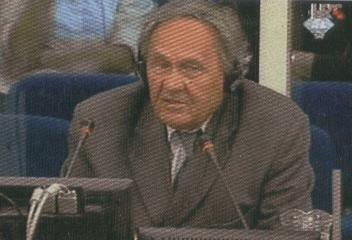 |
Manolic at The Hague
by Ines Sabalic

A pity that The Hague is so far from Zagreb and so unimportant to its inhabitants, since truly important things are unfolding there, at least for Croatia. Far from the eye of public interest, with myself as the only Croatian journalist to be present throughout his testimony, the country’s former wartime number two, Josip Manolić, delivered his crucial testimony for four whole days. In most of the media this was wrongly presented, and a quite different impression was given from what actually took place at The Hague. For it is even conceivable that, on the basis of this and Stjepan Mesić’s testimony, Croatia will extract itself from the charge of aggression against Bosnia.
Manolić’s strategy as a prosecution witness defending the Croatian state consisted in demonstrating that Tuđman and Š ušak were alone in the policy of partitioning Bosnia and war against the Bosniaks; and that a schism existed not just in society, in a political opposition that did not support that war, and not just in the government, but also at the very summit of the ruling party. Tuđman’s relays in Bosnia were Boban and Kordić, and as for this lot - here
Manolić gestures lightly towards the six leaders of Herzeg-Bosna in the dock - these third-ranking figures, the Court will decide how guilty they are.
In terms of concentration, seriousness, mastery of the material in detail and as a whole, and awareness of the unique political importance of his appearance, Manolić surpassed everyone else in the courtroom: the prosecutor, who sought - but did not manage - to pose the questions imposed by the defendants’ answers, since the material was perhaps too complex for him; even perhaps the bench of judges, who asked for explanations of a number of fairly simple matters from the war, ones that they should have known after long years of the Court’s functioning; the defence team, among whom only two lawyers caught Manolić’s drift - the dangerous Greek-American Karnavas, who took little nips everywhere to see where blood might be drawn, and the calm, methodical Vesna Alaburić. Manolić was simply of a quite different calibre, in a different class.
Apart from that, he spoke from conviction and spoke the truth, which made attack more difficult. Secondly, he is familiar with the offensive technique of cross-examination. For four days he never departed from the essence of what he wished to convey, and what had provided the motive for his appearance; and after every break in the Court’s procedure he would resume his intonation and point out the essence. Moreover, he showed great dignity and respect for the Court, whose task it will be to sift the grain from the chaff. In Manolić’s head everything is clearly arranged and decided in advance. There was no hatred for Tuđman, but even some understanding and a glint of former friendship. But obviously the number two’s judgement was that the number one, Tuđman, must posthumously be sacrificed to the Court. That is ultimately only appropriate, as Manolić’s testimony makes clear, since as he says Tuđman took responsibility for the policy towards Bosnia on account of which a trial is now taking place before an international court.
In the most important such trial - that of Milošević - through which the Tribunal should have justified its existence to the international community, it fell short. Its implosion is visible not only in the fact that within a couple of days it lost its main prosecution witness, Milan Babić, and its main defendant, Slobodan Milošević - and it did not need to - but elsewhere too. It has allowed sinister underworld figures like the head of the Yugoslav intelligence service Jovica Stanišić to await trial in freedom; or has promptly bailed people indicted for Srebrenica - people, moreover, who had not given themselves up voluntarily, but whom Belgrade had long had to be begged to arrest. It is also the case that the best people have left the Tribunal, even though there are still some who are serious and honest.
At all events, a number of trials affecting Croatia are now unfolding against this background of the implosion of a UN institution supposed to advance awareness of responsibility for life in the Balkans. One is that of Milan Martić; another is for the massacre at Ovčara. But the third involves the indictment for Herzeg-Bosna, and it is this last which will make clear whether Croatia as a state bears guilt for aggression against Bosnia and the war against the Bosniaks.
Manolić, in brief responses about himself, mentions anti-fascism - and that is indeed clearly his basic stance. Like Boljkovac or Vonta, he is a patriot and an anti-fascist. In reality he has remained a Croatian partisan, as was consistently shown before this Court. Such people were organically incapable of comprehending the Ustasha baggage dragged in at the start of the war. The prosecution witness for Herzeg-Bosna remained a partisan, could not tolerate expressions of extreme nationalism, and wished in brief for the brotherhood and unity [of the partisans] to be replaced in Croatia and in Bosnia by [a new] brotherhood and unity.

Translated from Globus (Zagreb), 14 July 2006
|